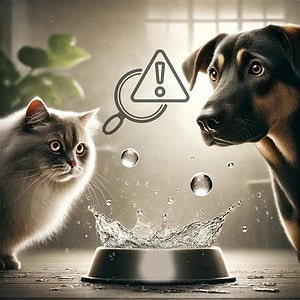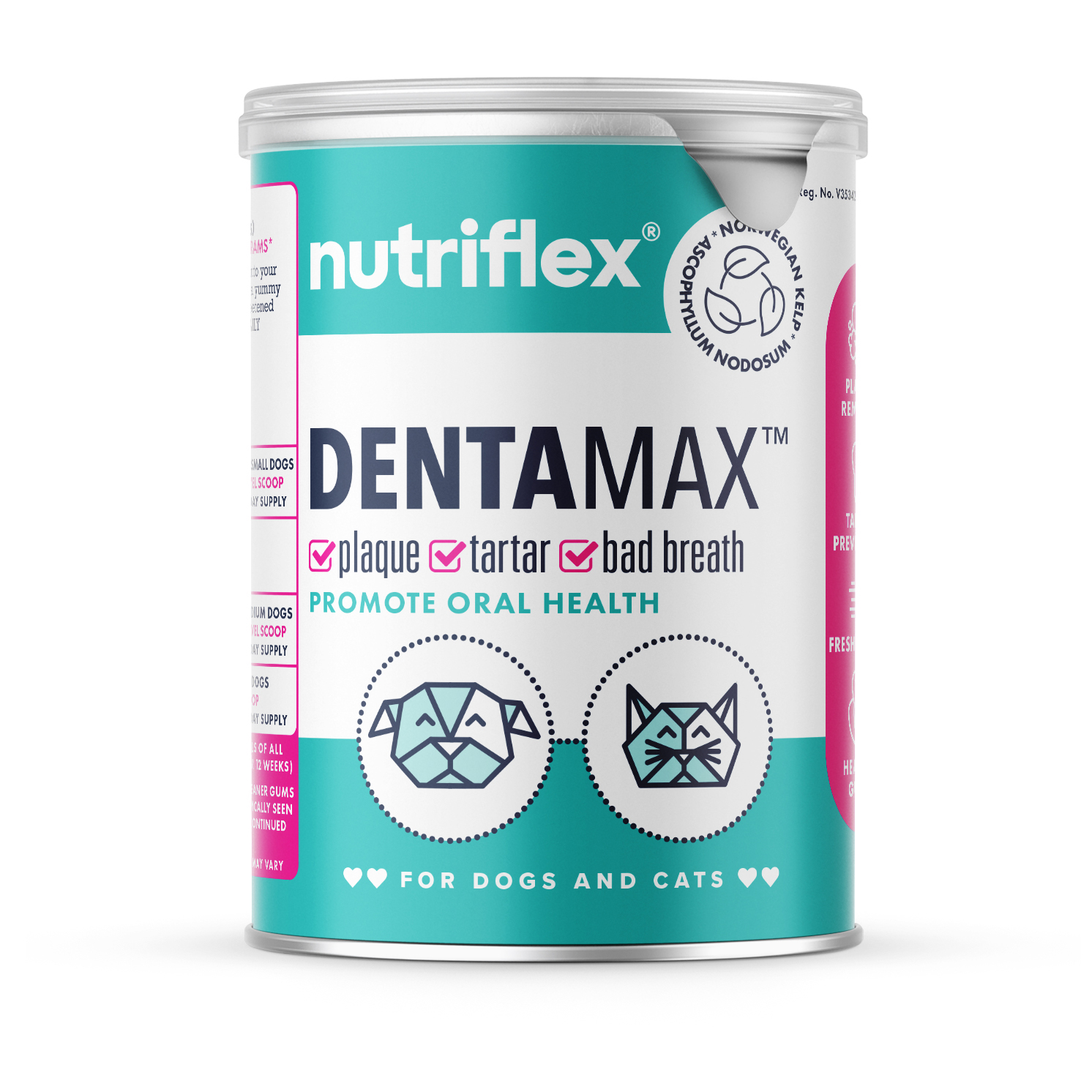
As pet owners, we want the best for our furry friends, ensuring their health and happiness. Oral care for pets is an essential part of their overall well-being, and dental water additives are often marketed as a convenient solution to improve your pet’s dental hygiene. However, while these products may seem like a quick fix for bad breath and plaque buildup, some common ingredients could negatively affect your dog or cat’s long-term health.
In this article, we’ll examine the potentially harmful ingredients in many dental water additives and explain why they could be a cause for concern.
What are Dental Water Additives?
Dental water additives for dogs are liquid solutions that can be mixed into a dog’s drinking water to promote oral health. These products help reduce plaque buildup, prevent tooth decay, and control bad breath. They are particularly beneficial for dogs that may not tolerate traditional tooth brushing or for owners looking for an easier way to maintain their dog’s dental hygiene.
How They Work:
- Prevent Tooth Decay: Dental water additives contain ingredients that help inhibit the growth of bacteria in the mouth, reducing the risk of tooth decay and gum disease.
- Reduce Plaque Buildup: Regular use of these additives can help slow down the accumulation of plaque on teeth, which is crucial for preventing periodontal disease.
- Control Bad Breath: Many dental water additives are formulated to address bad breath by neutralising odours and promoting fresher breath.
Usage:
- Dental water additives are typically added to a dog’s water bowl daily, and they work best when fresh water is provided regularly.
- Some products may also have a gel option that can be applied directly to the teeth or gums.
Considerations:
- Not all dogs may enjoy the taste of these additives, and some dogs with sensitive stomachs may experience digestive upset.
- Pet owners should always check the ingredients for harmful substances like xylitol and consult a veterinarian, especially if their dog has any pre-existing health conditions or digestive issues.
Dental water additives are often marketed as a convenient solution to support your dog’s dental care routine, especially when combined with other methods like dental treats or professional cleanings.
However, it’s essential to understand that not all of these additives are created equally, and many contain potentially harmful chemicals that can pose long-term health risks to your pet.
While they seem like an easy fix for bad breath, plaque and healthy teeth, these additives could lead to serious health concerns over time. Awareness of the risks and choosing safer, natural alternatives is crucial to protecting your pet’s overall health and well-being.
Dental Water Additives: Harmful Ingredients
1. Sodium Benzoate: A Potential Carcinogen
To prevent microbial growth, sodium benzoate is frequently used as a preservative in dental water additives. While small amounts are considered safe, long-term exposure may pose serious risks. In acidic environments, sodium benzoate can react to form benzene, a known carcinogen linked to certain types of cancer. Additionally, continuous exposure may cause liver damage and oxidative stress in pets, potentially harming cells over time.
Why It’s Harmful:
- Risk of forming cancer-causing compounds
- Potential liver damage and oxidative stress
2. Sodium Citrate: Altering Your Pet’s Natural Balance
Sodium citrate is used as a stabilising agent in dental water additives. Although relatively safe in controlled doses, chronic consumption may alter your pet’s natural acid-base balance, especially in the stomach and kidneys. This could lead to digestive issues such as diarrhoea or even metabolic imbalances over time, making it particularly risky for pets with pre-existing kidney or digestive conditions.
Why It’s Harmful:
- It can disrupt the body’s natural acid-base balance
- It may cause digestive issues and diarrhoea with prolonged use
3. Stabilised Chlorine Dioxide (Oxygene®): Disrupting Oral and Gut Bacteria
Stabilised chlorine dioxide, often labelled as Oxygene®, and a key component of Oxyfresh® is a powerful oxidising agent that helps neutralise bacteria and odours in the mouth. While it can effectively reduce plaque and bad breath, continuous ingestion can lead to long-term issues. Chlorine dioxide may disrupt the balance of good bacteria in the mouth and gut, leading to oral and digestive imbalances. Prolonged use can also irritate your pet’s mucous membranes, causing discomfort and potential health problems.
Why It’s Harmful:
- Disrupts beneficial oral and gut bacteria
- Irritates the mouth and gastrointestinal tract
4. Zinc Acetate: The Risk of Zinc Poisoning
Zinc is an essential mineral for your pet, but too much can be toxic. Dental water additives containing zinc acetate may put your dog or cat at risk of zinc poisoning if consumed regularly. Symptoms of zinc poisoning include vomiting, diarrhoea, and even kidney damage. Furthermore, excess zinc can interfere with absorbing other essential minerals such as copper and iron, potentially causing nutritional imbalances over time.
Why It’s Harmful:
- Excess zinc can lead to poisoning and nutritional imbalances
- Potential kidney damage with long-term use
5. Sodium Hydroxide: A Highly Alkaline Risk
Sodium hydroxide is a strong alkaline compound commonly used in dog mouthwash that adjusts pH levels in dental water additives. However, ingesting this compound in any quantity can be harmful. Over time, sodium hydroxide can irritate your pet’s mouth, throat, and stomach lining, causing gastrointestinal issues such as ulcers or chronic digestive discomfort.
Why It’s Harmful:
- It can irritate the mouth, throat, and stomach
- This may lead to ulcers or long-term digestive problems
6. Chlorophyllin-Copper Complex: Risks for Copper-Sensitive Breeds
Chlorophyllin-copper complex is included in some products for its deodorizing properties, but it may not be safe for all pets. Long-term exposure to this compound could lead to an excess buildup of copper in your pet’s system, particularly in breeds prone to copper storage disease, such as Bedlington Terriers or Dobermans. Over time, copper accumulation can result in liver damage and other serious health complications.
Why It’s Harmful:
- Excessive copper intake can lead to copper storage disease
- Potential liver damage for sensitive breeds
Safer Alternatives for Your Pet’s Dental Health
Given the risks associated with these common ingredients in dental water additives, it’s essential to consider safer, more natural alternatives for maintaining your pet’s oral hygiene. Some alternatives include:
- Natural dental chews: Many dental chews contain ingredients that promote oral health without harmful additives. They can help reduce plaque and tartar naturally through chewing action, and some include beneficial enzymes or minerals to support gum health.
- Regular brushing: Brushing your pet’s teeth with pet-safe toothpaste is one of the most effective ways to maintain oral hygiene. Tooth brushing helps physically remove plaque and keeps bacteria in check, reducing the risk of gum disease and bad breath.
- Dietary changes: Certain foods and supplements can support dental health by naturally reducing plaque and promoting healthy gums. For example, feeding your pet raw, meaty bones can naturally help clean their teeth. Additionally, adding dental supplements like DentaMax Dental Powder to your pet’s diet is a convenient and highly effective option. DentaMax is made from 100% natural ingredients and is free from harmful chemicals like Sodium Benzoate and Chlorine Dioxide. It uses natural enzymes and minerals to reduce plaque and tartar buildup, promoting cleaner teeth, healthier gums and fresher breath without causing adverse effects or long-term health risks. Simply sprinkle it onto your pet’s food once daily for an easy, chemical-free dental care solution.
By incorporating these safer alternatives into your pet’s routine, you can ensure they maintain excellent oral health and fresh breath without exposing them to the risks of potentially harmful additives in many dental water and oral mouthwash products.
Conclusion: Read Labels and Choose Wisely
Before adding any dental water additive to your dog or cat’s daily routine, it’s essential to read the ingredient list carefully before adding them to your pet’s water bowl. While these dental health products may promise quick and easy oral care, some ingredients can pose significant risks to your pet’s long-term health. Always consult your veterinarian when introducing new dental care products and opt for safer, natural options whenever possible.
Your pet’s health is in your hands, and choosing the right oral care products can make all the difference in ensuring a happy, healthy life.
BEST SELLER

DentaMax Dental Powder for Dogs and Cats
348 Reviews
The secret to fresh breath and clean teeth powered by clinically proven seaweed. The result is visibly whiter teeth, cleaner gums and fresher breath for your pet within just 3 - 12 weeks. No tooth brushing is required.
- Eliminate bad breath
- Remove plaque accumulation
- Prevent tartar, tooth decay and gum disease
Common Side Effects of Water Additives
While dental water additives can be beneficial in maintaining your dog’s oral hygiene, they aren’t without potential side effects. Understanding these risks is essential to ensure you make an informed choice for your pet’s dental care routine.
1. Gastrointestinal Upset
One of water additives’ most commonly reported side effects is gastrointestinal upset. Ingredients in certain dental additives can lead to stomach issues, such as diarrhoea or vomiting, especially if the additive is not well-tolerated by your pet. This risk may be heightened in pets with sensitive stomachs. If you notice any changes in your dog’s digestion after introducing a new dental product to their drinking water, you should stop its use and consult your veterinarian.
2. Allergic Reactions
Some dental water additives contain flavouring agents, preservatives, or chemicals that may trigger allergic reactions in some dogs. Symptoms can include itching, redness, swelling, or gastrointestinal distress. If you suspect your pet is experiencing an allergic reaction, discontinue use immediately and seek veterinary help.
3. Changes in Appetite
Dogs rely on their sense of taste to enjoy their meals and stay hydrated. Some dental water additives can impart flavours that may be unpleasant or overwhelming for certain dogs, leading to a reluctance to drink their water or consume their food. Certain ingredients in dental water additives can interfere with a dog’s natural appetite or cause food aversion. Dogs may boycott their water dish altogether and may suffer from dehydration. Digestive upset is one of the significant side effects. Integrating a dental water additive might not be ideal if a dog has a sensitive stomach or has previously suffered from food aversions. Monitoring how your dog responds after introducing a new product is essential. If you notice them exhibiting any signs of reluctance towards water or food, it may be worth reevaluating the use of the dental water additive. You may want to consider alternative methods for dental care that are better suited to your dog’s preferences and sensitivities.